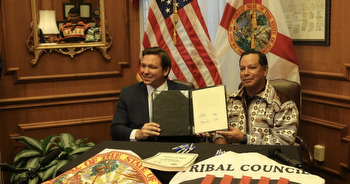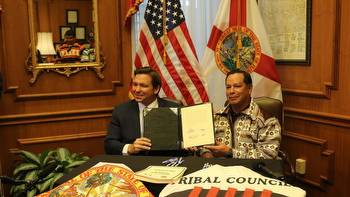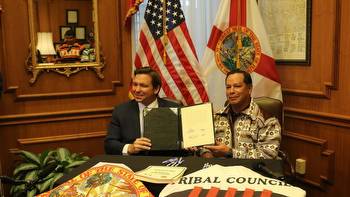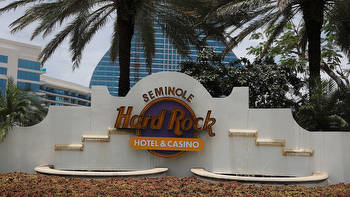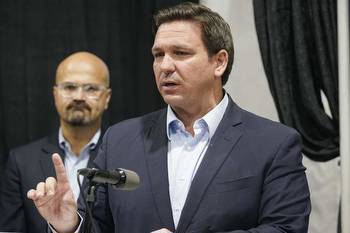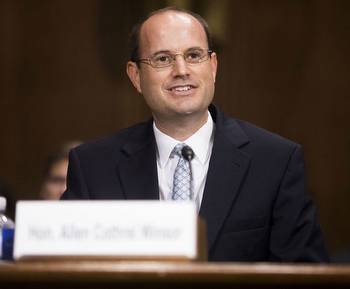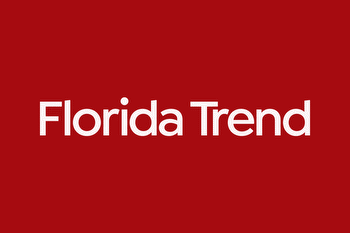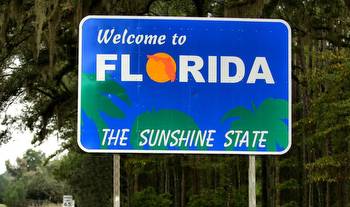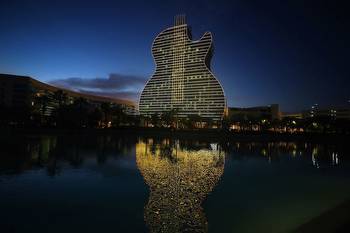No Casinos, businessmen sue Florida over gambling compact with Seminole Tribe

TALLAHASSEE — Two South Florida businessmen and the Orlando-based group No Casinos have filed a lawsuit seeking to block a deal that allows sports betting in Florida, arguing the agreement signed by Gov. Ron DeSantis and approved by the Legislature violates the state Constitution and federal laws.
The legal challenge, filed Monday in Washington, D.C., is the third federal lawsuit challenging the sweeping deal, known as a compact, giving the Seminole Tribe of Florida control of sports betting throughout the state.
Plaintiffs in the new lawsuit include South Florida developer Armando Codina and Miami car dealer Norman Braman, who have been longtime opponents of expanded gambling.
The challenge accuses President Joe Biden’s administration of violating federal law by allowing the compact to go into effect and failing to consider a 2018 Florida constitutional amendment that requires statewide voter approval of gambling expansions.
The compact, signed by DeSantis and Seminole Tribe of Florida Chairman Marcellus Osceola Jr. in April and later approved by the Legislature, opens the door for the first time to sports betting in Florida. Under the agreement, the Seminoles will serve as the host for sports betting and contract with pari-mutuels that would get a cut of online bets placed using the pari-mutuels’ mobile apps.
The Seminoles agreed to pay at least $2.5 billion over five years to the state in exchange for the rights to control sports betting. The deal also allows the tribe to add craps and roulette to its casino operations.
The “hub-and-spoke” sports-betting plan would allow gamblers throughout the state to place bets online, with the bets run through computer servers on tribal property. The compact says bets made anywhere in Florida “using a mobile app or other electronic device, shall be deemed to be exclusively conducted by the tribe.”
The U.S. Department of the Interior in August allowed the compact to go into effect, drawing a legal challenge in Washington from the owners of Magic City Casino in Miami-Dade County and Bonita Springs Poker Room in Southwest Florida. The owners of those pari-mutuels also filed a lawsuit in July in federal court in Tallahassee challenging the deal. Both of those lawsuits remain pending.
The new lawsuit filed by Codina, Braman and No Casinos contends that, by allowing sports betting to take place off of tribal lands, the federal agency’s approval of the deal “adversely impacts plaintiffs’ properties and neighborhoods by, among other things, increasing neighborhood traffic, increasing neighborhood congestion, increasing criminal activity, reducing open spaces and reducing their property values.”
Codina and partner Jim Carr developed a 600-acre senior living community about 2.5 miles from the Seminoles’ Hard Rock casino operations in Broward County. Monterra MF, LLC, which is an owner of the Cooper City development known as The Residences at Monterra Commons, is a plaintiff in the lawsuit.
“Now facing public accountability and voter resistance to efforts to expanded gambling, the state of Florida attempted to shield sweeping gambling expansion from public review by burying it in a new compact with the Seminole Tribe,” the 40-page lawsuit said. “In short, the 2021 compact converts every smartphone, tablet, laptop or desktop in Florida into a remote gambling device.”
The Seminoles brushed off the challenge, saying in a prepared statement that the “gaming compact is now in effect.”
“It has been agreed to by the governor and the Seminole Tribe, approved overwhelmingly by the Florida Legislature and deemed approved by the Department of the Interior. It has the support of two-thirds of Floridians. The state, the tribe and Seminole Gaming are moving forward,” the tribe said.
In the two other lawsuits, Magic City Casino and Bonita Springs Poker Room contend that the sports-betting plan violates federal laws and will cause a “significant and potentially devastating” impact on their businesses.









